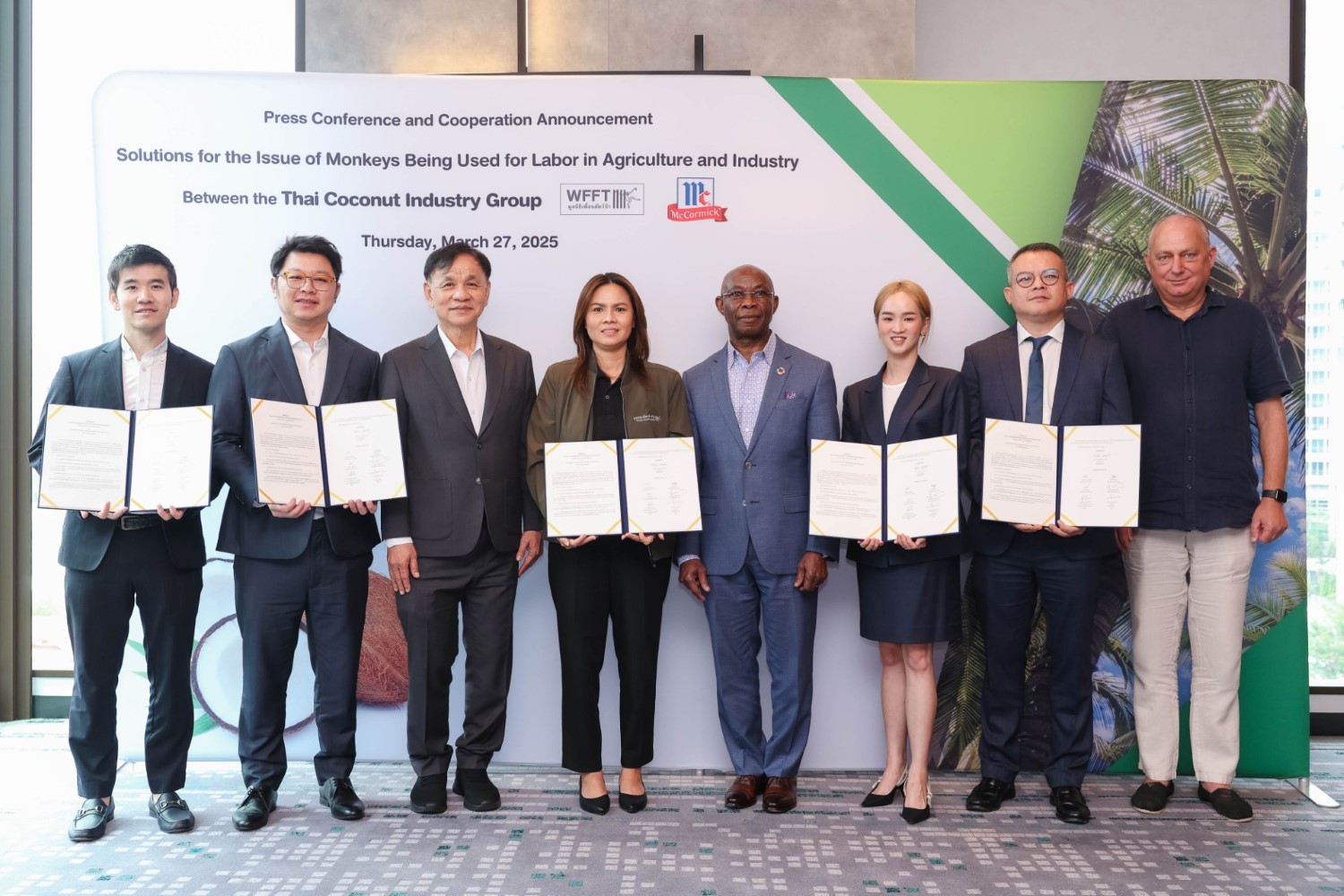
Bangkok, 31 March 2025 – Thai Coconut Industry Group, in collaboration with Wildlife Friends Foundation Thailand (WFFT), has signed a Memorandum of Understanding (MOU) to improve the welfare of monkeys potentially used in Thailand's coconut industry. This landmark agreement marks the first formal commitment to address this complex issue. The initiative begins with a joint project to care for monkeys currently or formerly used in agriculture and industry. The groups will then work to expand cooperation with relevant government agencies to advocate for legislation prohibiting the use of monkeys for coconut harvesting, coupled with rigorous enforcement. The agreement also promotes the adoption of modern harvesting techniques and the cultivation of dwarf coconut varieties. The core objective is to create lasting positive change within the industry and improve the perception of the Thai coconut industry on the global stage.
The coconut industry is vital to Thailand's economy, with the nation being a leading exporter of coconut products. According to the Ministry of Commerce, between 2020 and 2023, Thailand exported coconut products to 131 countries worldwide, generating over 25 billion baht annually and supporting the livelihoods of over 300,000 coconut farming households.
Historically, the use of monkeys to harvest coconuts has been a traditional practice in some regions. However, growing global awareness of animal welfare concerns has led to increased scrutiny of this practice, with many considering it unethical. This has resulted in criticism and complaints from animal welfare organizations, negatively impacting the reputation of Thai products in international markets and leading to boycotts of Thai coconut milk and other coconut products, particularly in Europe. These boycotts have cost the country an estimated 2 billion baht per year in lost export revenue. Therefore, a collaborative and integrated approach involving all stakeholders – government, private sector, and farmers – is essential to address this issue effectively. Fortunately, modern harvesting techniques and technologies are now available that can efficiently meet the needs of industrial-scale coconut production.
Thai Coconut Industry Group stated, "Our members have already taken steps to address these concerns, including sourcing coconuts from farms that do not use monkey labor and implementing traceability systems. However, a truly sustainable solution requires a collective effort, particularly from the government, which has the authority to enact and enforce legislation. This collaborative agreement represents a significant step forward, and we hope it will pave the way for a lasting, transparent, and practical solution. It also sends a clear message to consumers worldwide that the Thai coconut industry is committed to addressing this issue with the utmost seriousness."
Mr. Edwin Wiek, Founder and Secretary-general, Wildlife Friends Foundation Thailand, said, "WFFT is dedicated to protecting the rights and welfare of all animals, including wildlife. We recognize the genuine commitment of the Thai Coconut Industry Group and are pleased to facilitate discussions with the Wildlife Conservation Office, the Department of National Parks, Wildlife and Plant Conservation, and the Ministry of Natural Resources and Environment to promote the enactment and enforcement of effective legislation. We will also leverage our expertise to provide care for retired or rescued monkeys. We believe this collaboration marks a crucial turning point for the development of a sustainable and ethical industry in Thailand, enhancing the country's reputation for animal welfare on the international stage."
The collaboration between the Thai Coconut Industry Group and Wildlife Friends Foundation Thailand will initially focus on a joint project to provide care for monkeys currently or formerly used in agriculture and industry. Private sector members, including Suree Interfoods Co., Ltd., Theppadungporn Coconut Co., Ltd., Thai Coconut Public Company Limited, and Asiatic Agro Industry Co., Ltd., have collectively donated funds to establish a fund for WFFT to use in caring for these monkeys. In addition to these members, McCormick & Company and Merit Food Products Co., Ltd. have also contributed to the fund. This effort is supported by the Faculty of Veterinary Science, Mahidol University, which will provide aid and rehabilitation services, within the framework of the cooperation agreement between WFFT and the Department of National Parks, Wildlife and Plant Conservation, and in accordance with all applicable laws.
In addition, to foster long-term change, the collaborative agreement outlines the following key measures for future implementation:
-
Urge the government to expedite the enactment of clear and comprehensive legislation prohibiting the use of monkeys for coconut harvesting, including the establishment of appropriate and fair penalties for violations, and the effective enforcement of the law.
-
Encourage the closure of monkey training facilities (both formal and informal) and support the conversion of these facilities into care centers or sanctuaries for retired or rescued monkeys.
-
Promote the cultivation of hybrid (semi-dwarf) and aromatic (dwarf) coconut varieties in a concrete manner, under the framework of cooperation with the Horticultural Research Institute, Department of Agriculture, Ministry of Agriculture and Cooperatives, to support the provision of dwarf coconut varieties to farmers, which produce good yields and are easy to harvest.
-
Invest in the development of advanced harvesting technologies and tools to reduce reliance on monkey labor and increase production efficiency.
-
Implement robust traceability systems to ensure that no monkey labor is used in the production process and to create transparency throughout the supply chain.
Members are also committed to supporting the efforts of the Agricultural Products Division, Department of International Trade Promotion, Ministry of Commerce, and the Department of International Economic Affairs, Ministry of Foreign Affairs, in providing accurate information to relevant government agencies in foreign countries to improve the image of the Thai coconut industry and foster a more accurate understanding among consumers worldwide.




